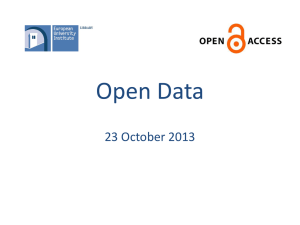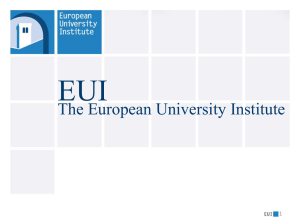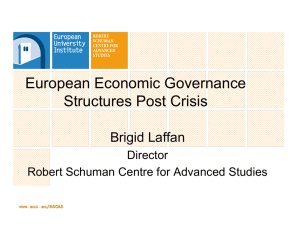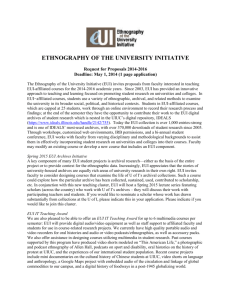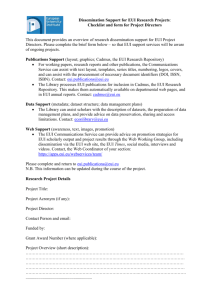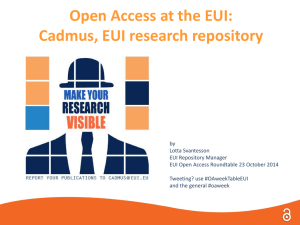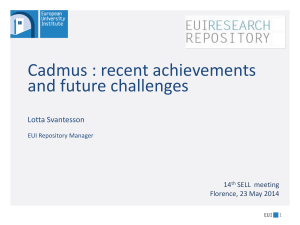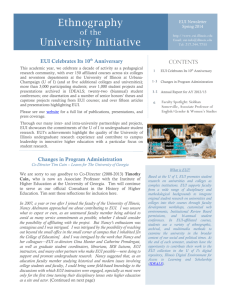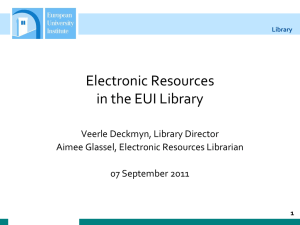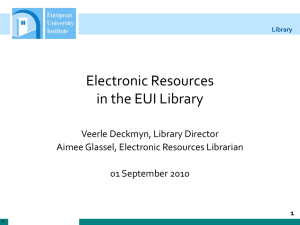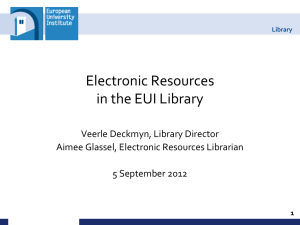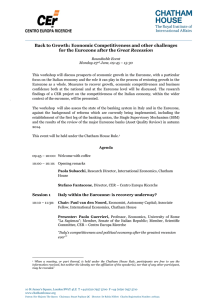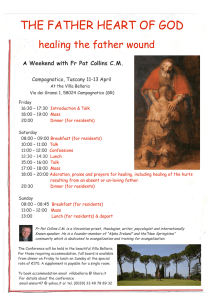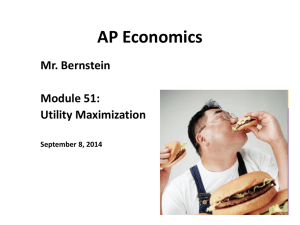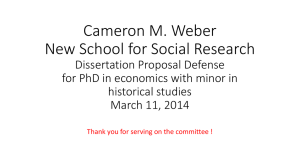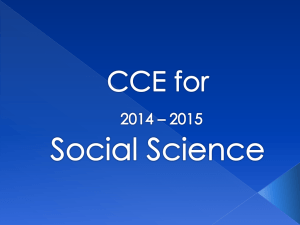Sector of Employment - European University Institute
advertisement
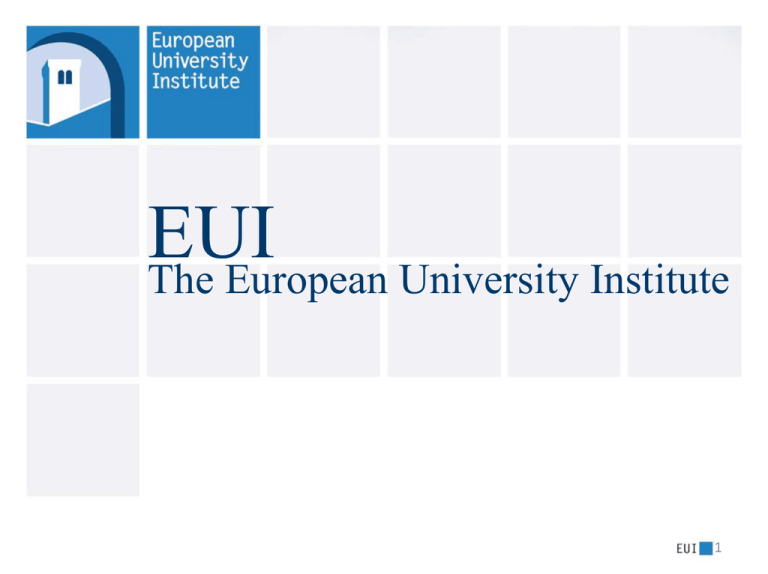
EUI The European University Institute 1 About the EUI The European University Institute (EUI) is an international organisation set up in 1972 to provide advanced academic training in the social sciences and to promote research at the highest level. 20 EU states are also current member states of the EUI. With an academic community of more than 1000 members from Europe and beyond, the Institute espouses an integrated, multidisciplinary approach to both teaching and research and transcends national academic traditions. 2 EUI Community 607 78 Full-time Researchers (doctoral students) Professors 147 Fellows and Research Staff 191 Administrative Staff 3 EUI Campus The campus of the European University Institute is spread over numerous historic buildings in the hills between Fiesole and Florence. Badia Fiesolana The Badia Fiesolana has been home to the EUI since 1976. It is the ‘heart’ of the Institute, home to: Library Office of the President Max Weber Programme Department of Political and Social Science Academic Service www.eui.eu/Campus 4 EUI Campus Villa Salviati Villa Schifanoia Villa Salviati hosts the: Historical Archives of the European Union Office of the Secretary General EUI Administration Villa Schifanoia houses: Department of Law Department of History and Civilization Academy of European Law www.eui.eu/Campus 5 EUI Campus Villa La Fonte Villa San Paolo Villa La Fonte, in San Domenico, will be the main building of the: Robert Schuman Centre for Advanced Studies ( as of January 2014) Villa San Paolo, near Piazza delle Cure, is home to the: Department of Economics www.eui.eu/Campus 6 Three Pillars of the EUI Pillar 1 Pillar 2 Pillar 3 The EUI’s four departments of Economics, History and Civilization, Law and Political and Social Sciences offer doctoral and post-doctoral training and summer schools. In addition, Law and Economics offer LLM and MA degrees, respectively. The Robert Schuman Centre for Advanced Studies promotes interdisciplinary and comparative research on major issues facing the European integration process and society. It hosts large research projects and offers advanced training at every level. The EUI hosts the Max Weber Programme, the largest postdoctoral training programme in the Social and Human Sciences in the world. The Programme is designed for junior post- docs who want to advance their research and academic training. 7 Department of Economics The Department of Economics performs theoretical and applied research on a wide range of topics of special relevance for European policy makers and institutions. It provides its researchers with course-based training in the areas of economics and econometrics. www.eui.eu/ECO 8 Department of Economics Current departmental research themes Analysis of Labour Markets Health Economics Behavioral Economics Inequality and Social Insurance Business Cycle Analysis Information and Contracts Economics of Education International Macro Evolution and Design of Institutions Law and Economics Experimental Economics Measuring and Modeling Financial Volatility Financial Crisis Fiscal and Monetary Policy Gender Economics Growth Policies www.eui.eu/ECO Monetary Economics Political Economy Time Series Econometrics and Forecasting 9 Department of History and Civilization The Department of History and Civilization focuses primarily on the history of Europe from the early modern period to the present. The Department encourages comparative and transnational approaches and promotes methodological diversity. The HEC faculty is comprised of social historians, cultural and intellectual historians, economic historians, and political historians. www.eui.eu/HEC 10 Department of History and Civilization Current departmental research themes The shaping of Modern Europe Intellectual History and the History of Science Power, Society, Ideology Imperial, Colonial and Global History www.eui.eu/HEC 11 Department of Law With a core focus on European Law, the Department is especially interested in the impact of globalisation on European and national legal systems and constitutional structures, and the interaction between these legal systems. The Department’s work in areas such as labour law, economic law, private law and administrative law reveals both the mutual interdependence of national legal systems and the emergence of transnational structures of governance. The department has also long specialized in international law, with research strands addressing human-rights protection, international economic and environmental law, as well as competition, regulation and governance at national, European and international levels. www.eui.eu/LAW 12 Department of Law Current departmental research themes The Europeanisation of law (especially private and economic law) The impact of constitutionalisation, enlargement and diversity on the law of the European Union The impact of globalisation on international law, Human Rights and global governance Social, linguistic and cognitive theories of law Theories, processes and structures of interaction between legal systems Competition law www.eui.eu/LAW 13 Department of Political and Social Sciences Rather than making rigid distinctions between political science, sociology, international relations and social and political theory, the Department of SPS focuses on research themes, some of which intersect the main social science disciplines. There is, however, a concentration on politics and society in Europe in its widest sense, including the external relations of Europe and comparative studies of European and non-European countries. www.eui.eu/SPS 14 Department of Political and Social Sciences Current departmental research themes Transformation of Government and Democracy Social Change in Europe and its Implications for Society, Politics & Public Policy Comparative Study of Public Policy Political and Social Structures and Behaviour International Relations and Security Social and Political Theory www.eui.eu/SPS 15 Robert Schuman Centre for Advanced Studies The Robert Schuman Centre for Advanced Studies (RSCAS) is devoted to inter-disciplinary, comparative, and policy research on the major issues regarding the European integration process. Research at the RSCAS is organised around core themes, each with its own research programmes and projects. www.eui.eu/RSCAS 16 Robert Schuman Centre for Advanced Studies Current research themes European Institutions, Governance and Democracy Migration Economic and Monetary Policy Global Governance Energy Policy and Climate Policy Competition Policy and Market Regulation International and Transnational Relations of the EU www.eui.eu/RSCAS 17 Max Weber Programme for Postdoctoral Studies The Max Weber Programme (MWP) is a postdoctoral training programme in the Social and Human Sciences. Max Weber Fellows are affiliated with one of the four EUI departments and are offered training and mentorship in developing professional skills such as teaching, academic writing and publishing and job market presentation. www.eui.eu/MaxWeberProgramme 18 Max Weber Programme for Postdoctoral Studies Principle activities include Multidisciplinary Research Workshops Academic Practice Activities Academic Communications Skills Lectures and Conferences www.eui.eu/MaxWeberProgramme 19 EUI Library Research at the Institute is supported by a first class Library in the Social Sciences, and a team of experienced librarians and information specialists. The collections include journals, monographs, electronic resources, databases, microforms, CD-ROMs in law, economics, history and civilization, and political and social sciences, with a special focus on Europe. Most of the Library’s holdings are on open shelving. The Library has the status of European Documentation Centre, an official depository of EU publications and documents. www.eui.eu/Library 2,000 printed journals More than 13,000 full text e-journals Over 500,000 volumes; over 435,000 e-books Numerous databases and networked CD-ROMs 20 Historical Archives of the European Union The Historical Archives of the European Union (HAEU) is a research centre dedicated to the archival preservation and study of European integration. Immagini da inserire www.eui.eu/HAEU The HAEU is the official archives for the historical documents of the Institutions of the European Union, and is home to more than 150 private archival deposits from eminent European politicians, movements and associations as well as a collection of documents relating to European integration from National Archives and Ministries of Foreign Affairs Archives. 21 Why Choose the EUI 1 A proven record of excellence with 40 years of experience focusing exclusively on doctoral and post-doctoral studies and research. 2 A welcoming, small, selective and supportive intellectual community where you become part of the academic life the moment you arrive. 3 Home to a world-class research library, the Historical Archives of the European Union and many other facilities. 22 Why Choose the EUI 4 One of the world’s largest doctoral and postdoctoral programmes in the social sciences, with an international research community of over 1,000 scholars from more than 60 countries. 5 Fully-funded PhD research programmes (145 grant offers for 201314) with first-rate faculty supervision. 6 High completion and placement rates, with graduates enjoying excellent career prospects in academia, international organizations, the public and private sectors and NGOs. 23 Why Choose the EUI 7 A vibrant, multi-disciplinary environment at the hub of numerous global research networks. 8 Joint exchange programmes with major European and North American universities and funding opportunities for research missions abroad. 9 Setting the global standard for doctoral studies. 24 Doctoral Programmes The EUI offers a highly-structured doctoral programme in its four departments Doctoral education at the EUI is not limited to writing a dissertation. It focuses on developing comprehensive academic literacy and skills. While each department determines its specific programme, the early part of one’s studies generally are focused on course work, methodological training, and research design. Second and third year researchers concentrate on developing their dissertations, which may include fieldwork, data collection, statistical analysis, time away on departmentallyfunded research missions and writing. The last year is dedicated to finishing and defending the thesis; some researchers take advantage of professional or university internships and teaching opportunities. Each programme is structured in a way that researchers have many opportunities to present their work to faculty and peers for feed-back over the course of their degree. 25 PhD Supervision The EUI prides itself on its high-quality PhD supervision. Faculty/researcher ratios are kept low, with professors supervising on average around 8 researchers at a time. Regular supervisions assessment surveys report very high satisfaction, and in 2012-2013, 89% of respondents* declared EUI thesis supervision to be good or very good. *The latest supervision assessment survey on the year 2012-2013 conducted on 548 researchers had a return rate of 85 %. 26 EUI Alumni EUI Alumni are prepared for careers not only in academia, but also in national and European governments and institutions, and in international organizations. EUI alumni occupy distinguished positions in top European and American universities and research centres including, among others, Sciences Po, the University of Cambridge, Oxford University, and Princeton University. Other EUI graduates lead important careers in institutions such as the European Central Bank, the European Commission, the European Parliament, and the International Monetary Fund. Finally, the EUI is honoured to have alumni who hold or have held high positions in national governments across Europe. 27 Career Placement of EUI Doctors Sector of Employment Academic Institution Bank Business/Finance Private Organisation Government Institution EU Institution International Organisation Non-Governmental Organisation Press Think Tank Consultancy Self-employed Other *Results are based on the feedback received from 888 respondents of the 2013 EUI Alumni survey. 28 Application Schedule for the Doctoral Programme 30 October 31 January February March First week of April Opening of application process Deadline for applications Processing of applications Interviews Mid-April Decisions about admissions End of August September Registration Introduction and opening of academic year 29 Admission and Language Requirements EUI candidates must meet the minimum degree requirements set by the national grant authorities by the beginning of the academic year for which they are applying. Further information at: www.eui.eu/DoctoralProgramme/AdmissionRequirements.aspx The expected level of English proficiency is level C1 of the Common European Framework of Reference (CEFR). Candidates must submit an English international language certificate (e.g. TOEFL, IELTS, Cambridge Proficiency, Cambridge Advanced) English native speakers, or those with a degree from a university programme taught in English who have written a thesis in English in that programme, are exempt from submitting a certificate of English proficiency. 30 www.eui.eu www.eui.eu/PhD applyres@eui.eu +39 055 4685 373 31
